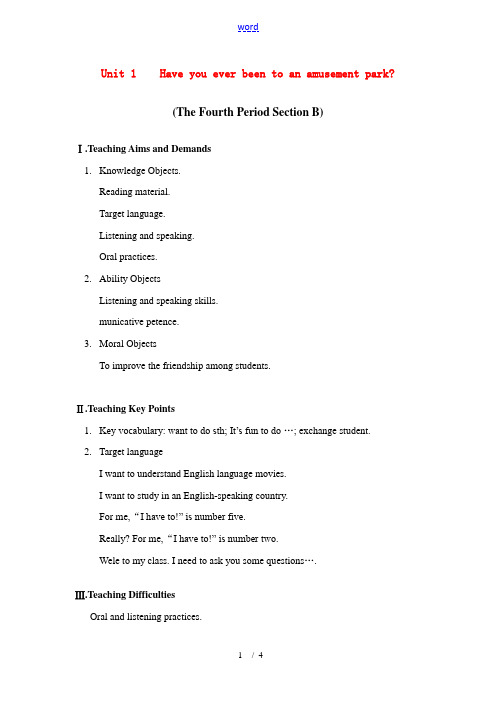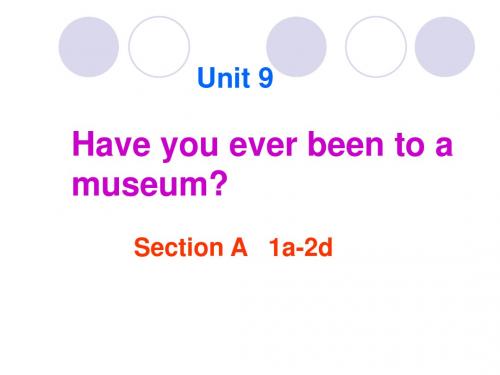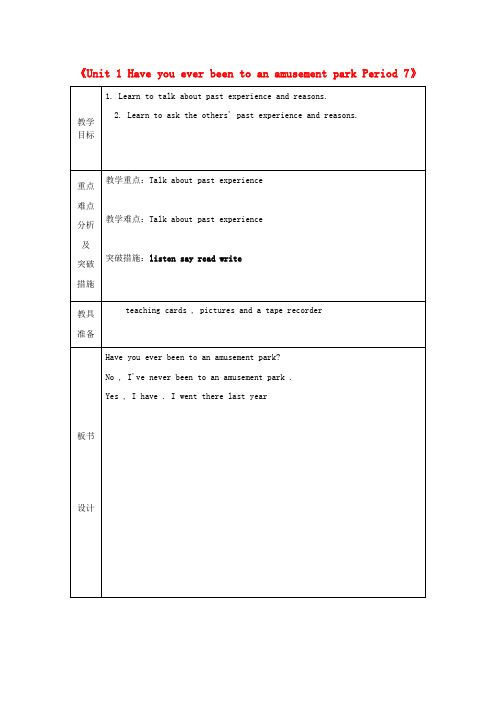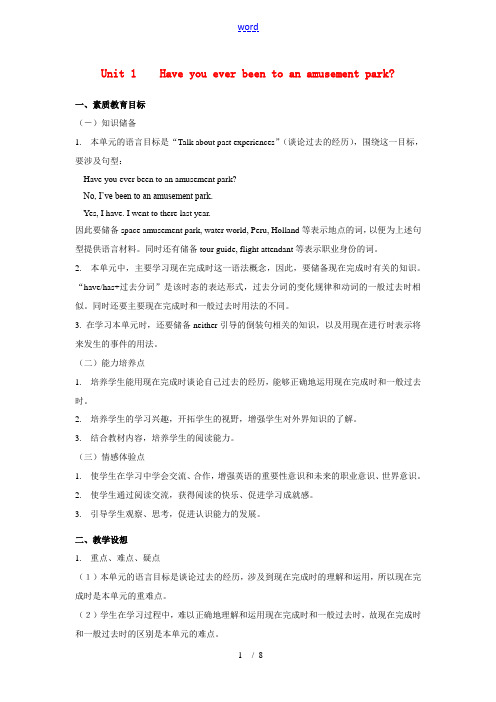八年级英语下册《Unit 1 Have you ever been to an amusement park Period 7》教案 鲁教版五四制
- 格式:doc
- 大小:48.00 KB
- 文档页数:6


Unit 1 Have you ever been to an amusement park?(The Fourth Period Section B)Ⅰ.Teaching Aims and Demands1.Knowledge Objects.Reading material.Target language.Listening and speaking.Oral practices.2.Ability ObjectsListening and speaking skills.municative petence.3.Moral ObjectsTo improve the friendship among students.Ⅱ.Teaching Key Points1.Key vocabulary: want to do sth; It’s fun to do…; exchange student.2.Target languageI want to understand English language movies.I want to study in an English-speaking country.For me,“I have to!” is number five.Really? For me,“I have to!” is number two.Wele to my class. I need to ask you some questions….Ⅲ.Teaching DifficultiesOral and listening practices.Ⅳ.Teaching Methodsmunicative approach.Pairwork.Ⅴ.Teaching AidsA tape recorder.A projector.Ⅵ.Teaching Procedures☆Step ⅠGreet the class as usual. Then ask students who are they on the screen? And where are they e from? (They’re Mickey Mouse and Donald Duck. They e from Disneyland.)T: Have you ever been to Disneyland?S: No, I haven’t.T: Would you like to go to Disneyland?S: Yes.T: In fact, our nation doesn’t have Disneyland now. So if you want to go to Disneyland, you have to go abroad. But if you go abroad, the most important thing you do is to know how to speak English well. When I was a young girl, I wanted to travel Disneyland, and I needed English to do that. So this is the reason of whyI study English.☆Step ⅡSection B 1aT: Just now, I have talked about the reason of why I study English. Then, what about yours?S: Because I want to be a translator.It’s fun to ….I have to.Some of these reasons are important to students, some of the reasons may not be important to them. Ask them to rank these reasons in the order of importance to you on page 71.☆Step Ⅲ1bAfter ranking the order, ask students to give the order of importance to them with their partners like this conversation on page 71. As students work, move around the room checking the progress of the pairs and offering help as needed.☆Step Ⅳ2aLet students to see the picture on the screen and ask students who are they? (A teacher and a student.) And what are they doing? ( The teacher is interviewing the student.)Ask students to listen to the tape carefully and circle the questions they hear. Say, one of the questions the teacher asks is How do you spell your last name?☆StepⅤ2bPlay the recording again and ask them to fill the questionnaire.☆Step Ⅵ2cAccording to the questions in activity 2a, ask students to role play the interview and make up a new conversation in small groups. Move around the room checking the progress of the pairs and offering help as needed.☆Step ⅦSummaryToday, we’ve talked about the importance of studying English. Each student has his/her ow n reason of studying English. I’m sure that if you continue to work hard,the wishes of all of you will be e true.Blackboard Design Why do you study English?Reasons: I want to understand English language movies.study in an English-speaking country.travel.I have to.It’s fun to learn another language.Name: ThomasStudying English for: three yearsEnglish-speaking countries visited: the United States When: he was thirteenReason for learning English: he wanted to travel the world。


U1 Have you ever been to单元时态专练制卷人:打自企;成别使;而都那。
审核人:众闪壹;春壹阑;各厅……日期:2022年二月八日。
姓名 _____________ 班级_______ 得分________I、单项选择 (60分)1.Listen! Some of the girls ____ about Harry Potter.A. are talkingB. talkC. were talkingD. talked2. She will have a holiday as soon as she ____ the work next week.A. finishesB. doesn’t finishC. will finishD. won’t finish3. -Where’s Jim?-He ______ to the shop. He’ll be back in an hour.A. goesB. goC. has goneD. will go4.Our teacher, Miss Chen, _____English on the radio the daybefore yesterday.A. teachesB. taughtC. will teachD. had taught5. I don’t think I_______ you in that dress before.A. have seenB. seeingC. sawD. see6. -Is your father in?-No, he _______ for three hours.A. was notB. has been outC. went outD. has gone out7. There _______ a football game this afternoon.A. will haveB. is going to beC. hasD. are going to be8. What ________ you _______ when I rang you up.A. are; doingB. were; doingC. do; doD. have; done9.Both his parents look sad. Maybe they ____what's happened to him .A. knewB. have knownC. must knowD. will know10. He has _____ been to Shanghai, has he ?A. alreadyB. neverC. everD. still11. Have you met Mr Li ______?A. justB. agoC. beforeD. a moment ago12. The famous writer ____ one new book in the past two years.A. is writingB. was writingC. wroteD. has written14. Zhao Lan ___already ___in this school for two years.A. was; studyingB. will; studyC. has ; studiedD. are; studying15. We _____ Xiao Li since she was a little girl.A. knowB. had knownC. have knownD. knew16. Harry Potter is a very nice film. I ____ it twice .A. will seeB. have seenC. sawD. see17. —These farmers have been to the United States.—Really? When ___ there?A. will they goB. did they goC. do they goD. have they gone18. — ______ you _____ your homework yet ?—Yes. I _____ it a moment ago.A. Did; do; finishedB. Have; done; finishedC. Have; done; have finishedD. will; do; finish19. His father ______ the Party since 1978.A. joinedB. has joinedC. was inD. has been in20. —Do you know him well ?— Sure. We _____ friends since ten years ago.A. wereB. have beenC. have becomeD. have made21. —How long have you ____ here ?—About two months.A. beenB. goneC. comeD. arrived23. The factory _____ since 1987.A. openedB. has openedC. was openedD. has been open24. I’ll lend you my bike, but you can only ___ it for two days.A. borrowB. lendC. keepD. take25. It _____ ten years since he left the army.A. isB. hasC. willD. was26. Miss Green isn‘t in the off ice. she____ to the library.A. has goneB. wentC. will goD. has been27. My parents _____ Shandong for ten years.A. have been inB. have been toC. have gone toD. have been28. My father _____ Shanghai twice.A. has been toB. has been inC. has gone toD. has gone in29. While I _____ in Beijing, it was raining hard.A. gotB. reachedC. arrivedD. was30. Miss Gao _____ this school since 1996.A. has come toB. came toC. has been inD. has taughtII、用所给单词的适当形式填空。

《Unit 1 Have you ever been to an amusement park Period 7》教学过程(包括导引新课、依标导学、异步训练、达标测试、作业设计等)Step 1Lead-in Ask the Ss the reasons why they want to learn English. And write down the reasons they say out.Order the number they think the most import reason and continue the same wayStep 2Pairwork Ask some students:Why do you study English ? Say out the reasonsAsk and answer in pairsSome pairs act out Task 2: How long have been studying English ?Step 3Secti on B2a,2b Ask the students to read the statementsPlay the tapeCheck the answersAsk the Ss finish the followingquestionnaire:Name:Studying English for:When and why:English-speaking c ountries visits:When:Reason for learning English: Read the statements and get ready for readingListen and circle the questions .Listen again and fill in the questionnaire单元分析内容提示本单元围绕谈论过去的经历,学习利用此刻完成时态。

Unit 1 Have you ever been to an amusement park?一、素质教育目标(-)知识储备1.本单元的语言目标是“Talk about past experiences”(谈论过去的经历),围绕这一目标,要涉及句型:---Have you ever been to an amusement park?---No, I’ve been to an amusement park.---Yes, I have. I went to there last year.因此要储备space amusement park, water world, Peru, Holland等表示地点的词,以便为上述句型提供语言材料。
同时还有储备tour guide, flight attendant等表示职业身份的词。
2.本单元中,主要学习现在完成时这一语法概念,因此,要储备现在完成时有关的知识。
“have/has+过去分词”是该时态的表达形式,过去分词的变化规律和动词的一般过去时相似。
同时还要主要现在完成时和一般过去时用法的不同。
3. 在学习本单元时,还要储备neither引导的倒装句相关的知识,以及用现在进行时表示将来发生的事件的用法。
(二)能力培养点1.培养学生能用现在完成时谈论自己过去的经历,能够正确地运用现在完成时和一般过去时。
2.培养学生的学习兴趣,开拓学生的视野,增强学生对外界知识的了解。
3.结合教材内容,培养学生的阅读能力。
(三)情感体验点1.使学生在学习中学会交流、合作,增强英语的重要性意识和未来的职业意识、世界意识。
2.使学生通过阅读交流,获得阅读的快乐、促进学习成就感。
3.引导学生观察、思考,促进认识能力的发展。
二、教学设想1.重点、难点、疑点(1)本单元的语言目标是谈论过去的经历,涉及到现在完成时的理解和运用,所以现在完成时是本单元的重难点。
(2)学生在学习过程中,难以正确地理解和运用现在完成时和一般过去时,故现在完成时和一般过去时的区别是本单元的难点。
《完整版新人教版八年级下册英语课文翻译》一、Unit 1 What's the matter?Section A1.1 —What's the matter with you, Peter?——彼得,你怎么了?—My back hurts.——我的背疼。
1.2 —What's the matter with your leg?——你的腿怎么了?—I think it might be broken.——我觉得可能是骨折了。
Section B2.1 —Can you help me, please?——请问你能帮我一下吗?—Sure, what's the matter?——当然,怎么了?2.2 —I have a toothache.——我牙疼。
—You should see a dentist.——你应该去看牙医。
二、Unit 2 I'll help to clean up the city parks.Section A3.1 —Why do you want to volunteer?——你为什么想当志愿者?——我想为我的社区做出贡献。
3.2 —What can we do to help?——我们能做些什么来帮忙?—We can plant trees and flowers to make the city more beautiful.——我们可以种树和花,让城市变得更加美丽。
Section C4.1 —Do you often volunteer at the animal center?——你经常在动物中心做志愿者吗?—Yes, I do. I love animals and I want to take care of them.——是的,我经常去。
我爱动物,我想照顾它们。
4.2 —What did you do last weekend?——你上周末做了什么?—I helped to clean up a park with my friends.——我和朋友们帮忙清理了一个公园。
《Unit 1 Have you ever been to an amusement park Period 1》教学过程(包括导引新课、依标导学、异步训练、达标测试、作业设计等)Step 1 Assign the taskNew languageHave you ever been to E urope ?Yes ,I have . / No , I’ve never been to Europe .In this unit ,students learn to talk about past experien ces in the other way .Step 2 Warm up Section A (1a-1c)SB Page 68 , 1a .1. Read each of the words and phrases at the top of the page to the class .2. Read the instructions .3. Do a quick check t o see where Ss would like most to visit .SB Page 68 , 1b .1. Read the instructions .2. Point out the sample answer .3. Play the recording .Ask Ss to check off their answers .SB Page 68 , 1c .1. Read the instructions for the activity .2. Point to the example in the sample dialogue .Ask two students to read the dialogue to the class .3. Then have Ss work in pairs .4. Check the answers by calling on several different pairs of students to say their conversations to the class .Step 3 Pre-taskSB Page 69 , 2a .1. Read the instructions .2. Point to the map ,play the recording and ask Ss to circle places on the map .3. Correct the answers .SB Page 69 , 2b .1. Read the instructions .Point out the sample answer .2. Point out the statements about the three conversations .3. Play the recording agai n .Ask Ss to circle the word true or false after each statement .4. Correct the answers .SB Page 69 , 2c .1. Point to the map and tell Ss they can talk about any of the places on the map .2. Ask Ss to work in pairs .3. Ask several pairs of students to say their conversations to the class .Step 4 Grammar FocusReview the grammar box .Ask students to say t he statements and responses .Exercise designing for Period 1 :词组翻译1. 太空博物馆2. 娱乐公园3. 水上公园4. 乘地铁5. 去年6. 明年。
《Unit 1 Have you ever been to an amusement park Period 7》
Unit 1 Have you ever been to an amusement park
单元分析
内容提示
本单元围绕谈论过去的经历,学习使用现在完成时态。
通过对学生们喜闻乐见的一些娱乐场所(fun places)的描述,反复运用句型Have you ever been to…? I’ve never been to…. 来激发他们使用本单元所学单词的兴趣。
教材中提供的所有活动都以现在完成时态为中心,通过一系列的听、说、读、写的训练,来加深对现在完成时态的理解,明白英汉两种在结构及表达方法的一些异同点。
从而提高他们运用所学语言的综合能力。
教学目标
1) 知识目标:
学习单词:Section A----space museum, amusement park, aquarium, boat, water park, theme park, neither;
Section B----English-speaking country, language, flight attendant, tour guide, used, improve;
Self Check----understand, decide, rent, show, special 掌握句型:Section A----Have you ever been to an amusement park?
Yes, I have. / No, I haven’t.
I’ve never been to a water park.
Me neither. / Me too. / So have I.
Section B----I want to understand English language movies.
I want to study in an English-speaking country.
It’s fun to learn another language.
I have to.
I want to travel.
2) 能力目标:训练学生运用所学知识进行听、说、读、写的综合能力。
3) 情感目标:引导学生学会与别人分享快乐,发现身边的美好事物,从而树立正确的人生观和价值观。
培养学生学习英语的强烈兴趣,意识到合作学习的重要性。
教学重点和难点
重点:1) 掌握本单元的目标语言Have you ever been to…? / I’ve never been to….
2) 记忆本单元的主要单词。
难点:1)比较现在完成时态与一般过去时态的异同。
2)听力课文中关键单词、短语及句子的理解。
3)帮助学生掌握阅读课文中的难句。
学情分析
本单元分Section A和Section B两部分。
Section A中通过所设计的各项任务呈现了两篇听力课文和一篇阅读理解。
Section B则安排了一篇听力和两篇小短文,用以加强对目标语言的理解。
Self Check部分是用来检查学生对本单元所学目标语言的综合运用能力。
单元后的语篇训练旨在通过目标语言培养学生的阅读理解能力,掌握一些基本的阅读技巧。
Section A涉及两篇听力课文及一篇阅读理解。
按先输入,再输出的原则,以Have you ever been to …? / I’ve never been to. …为知识中心设计一系列听、说、读、写的任务,由浅入深,由易到难,谈论学生喜闻乐见的一些娱乐场所,使学生学会运用现在完成时来谈论过去的经历。
计划2课时完成。
第一课时(1a-2c)以key vocabulary和理解Present Perfect Tense的结构为主来设计任务。
从单元的整体框架来看,这部分是一个介绍和导入部分,主要的目标语言及话题在这一部分呈现。
可采用以旧带新的方法来呈现现在完成时的结构。
所选材料来源于现实,为学生所熟悉,能引起学生的学习兴趣。
尤其是课本上所提供的问题及画面能强烈刺激
学生的感官,调动起他们的求知欲。
(2a-2c)以一幅城市的旅游地图开始设计任务, 以三小段听力谈话为中心,使得目标语言在这一部分得以延伸。
加之适当的语法总结和语言点的精讲,能使学生对Have you ever been to…?/I’ve never been to….更加清楚。
将Pairwork 部分设计成一任务能更有效的帮助学生理解目标语言。
第二课时(3a-4)这是一篇长课文“Have you ever been to Disneyland?”。
着眼点并不是对文中语言点的讲解,而在于整体掌握文章的结构及基本的写作手法。
可根据文章设计一系列问题,让学生通过合作,自主去寻找、发现答案。
通过组织Pairwork和Groupwork来传授目标语言在语篇中的运用。
Section B包括一篇听力和两篇短文。
设计一次采访任务的角色表演和小组合作学习探讨的模式,从而加深学生对现在完成时在具体真实语境中的理解。
拟2课时教完。
第三课时(1a-2c)第一部分以Why do you study English?为话题,鼓励学生给出不同的有趣答案,充分调动课堂学习气氛。
而第二部分的听力,让学生捕捉目标语言在真实语境中的具体运用,以及与其它时态的对比。
拟用Pairwork来设计一次采访任务,这对学生则充满着挑战。
可通过适当的引导,给出问题,化难为易。
第四课时(3a-4)有两篇短文。
重点应放在使用目标语言的写作能力训练上。
3a 可设计成限时阅读竞答,把学生分成几大组来抢答课文中的8个问题。
然后通过多媒体适当呈现文章中的一些重、难点,强化记忆。
可将4调到3b-3c之前为3b-3c的写作扫清一些障碍。
该写作练习有点难,但可以帮助学生养成即时使用目标语言及词汇写作的习惯。
课时安排
4课时
第一课时:Section A:la,1b,lc,2a,2b,2c
第二课时:Section A:3a,3b,4
第三课时:Section B:1a,1b,2a,2b,2c
第四课时:Section B:3a,3b,3c,4 and Self Check。